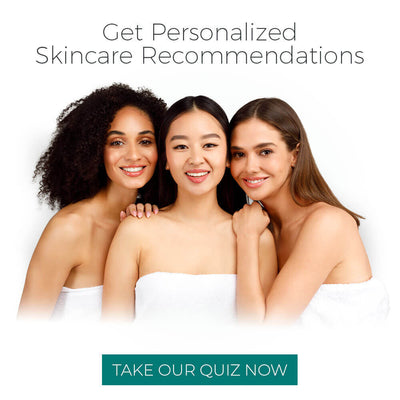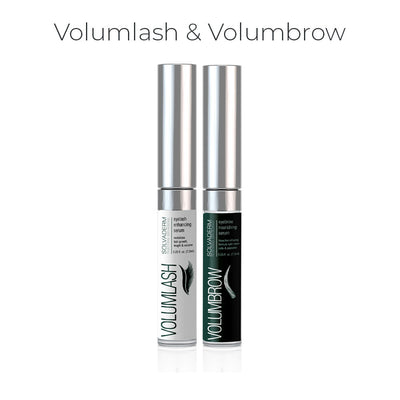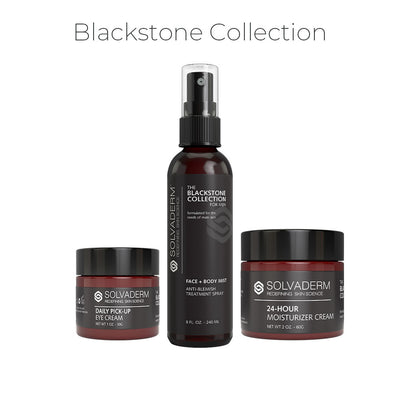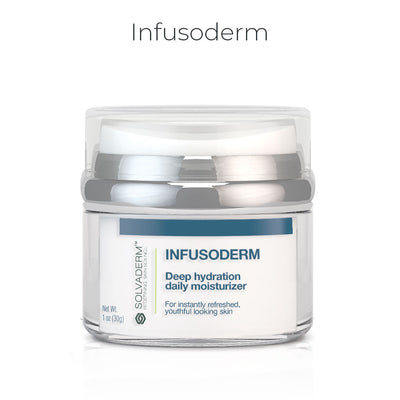In this review, we’ll discuss the causes of different types of acne and how you might treat it. We’ll look further at the need for a moisturizer for acne, and we’ll address the wide-ranging actions of these products.[1]
Understanding the types of acne, as well as certain ingredients and types of moisturizers, will help drive the perfect match for your skin care needs.
What is Acne?
Acne is an inflammatory skin condition that can result in the development of lesions and scarring on your skin.[2] You may often see pimples or zits on your face, but acne is also commonly seen on the chest, back, and even your arms. You also may be dealing with inflammatory or non-inflammatory lesions.
The different causes of acne result in wide-ranging manifestations, such as the appearance, the way it feels, and how it impacts your daily life. Knowing the personal characteristics of your acne can help determine the best moisturizer as well.
Who Gets Acne?
If you feel alone or burdened by your acne, there may be some comfort in knowing that this is a common condition. Believe it or not, acne is seen in nearly 85% of adolescents and young adults, with 15% to 20 % of these occurrences being moderate to severe.[3]
Many people are dealing with this skin condition, whether it’s due to certain foods within the diet or the reaction to specific fabrics and cosmetic products.
Some biological aspects and the efficiency of immune defense can make a difference regarding who is more susceptible to developing acne, but this non-discriminating condition can affect anyone.
Causes of Acne
1. Excess Oil Production
You will need a moisturizer for oily skin to deal with the excess build-up of oil. Diet and hormones play a large role here. Highly fattening and sugary foods can stimulate insulin, increasing the oil gland cells.[4] The hormonal fluctuations experienced during puberty can also lead to greater oil production.
2. Clogged Pores
Oil and dead skin cell build-up can cause clogged pores. This congestion leads to inflammation of the follicles connected to oil glands, and it creates sores from underneath the skin. These blister-like structures become irritated and are usually characterized by itchiness and discoloration, resulting in pimples, blackheads, or whiteheads.[5]
3. Bacterial Infection
Bacterial infection triggers acne development when bacteria get trapped inside the pores.[6] This is advanced further when the bacteria infiltrates skin barriers. It is common to see this occur when the host immune system cannot put up a great defense, permitting bacterial colonization of opportunistic types that drive skin conditions.
Know the Difference Between Dry Acne and Oily Acne
You must have an understanding of your acne type when you select your moisturizer for acne. The distinguishing factor between oily and dry is based on the amount of sebum produced. Oily skin is characterized by excessive sebum production, and with dry skin, there seems to be barely any sebum produced at all. Additionally, oily acne is marked by large pores and a shiny yet dull look, while dry acne presents a bright face, fine lines, and a tight feeling.
A thick and greasy layer of oil on your skin is reflective of oily acne. This is due to the excessive sebum production. You are most likely to see oily acne during puberty or phases of menstruation. Hormonal fluctuations are usually at the heart of oily acne.[7]
Dry acne isn’t as black and white compared to oily acne because there are several contributing factors. If you have dry skin, you’ll probably end up with blemishes related to dry acne. Dryness dampens skin elasticity and increases susceptibility to infection. There is a disturbance in the lipid layer surrounding keratinocytes, which leaves your skin open to bacteria and inflammation. Additionally, there may be an overdrive of sebum production to overcompensate for dryness.
Tips to Choose the Best Moisturizers for Acne Prone Skin
Overall, you’ll find that the best face moisturizer for acne-prone skin will be a non-comedogenic product. A product of this nature will fight the blockage of your pores. Using products like this will be vital because clogged pores are often the cause of the problem and lead to blackheads and zits. You don’t want the product to be counterproductive, so you’re looking to avoid irritants as well.
The best moisturizer for acne will be a lotion instead of a cream. A lotion will have a more lightweight formula that won’t make your skin look or feel greasy. Additionally, you should opt for fragrance-free, hypoallergenic formulas that don’t have unwanted ingredients that can irritate your skin.
Try to find products that include salicylic acid, tea tree oil, and hyaluronic acid. You’ll want to steer clear of coconut oil and petroleum as they clog pores, and alcohol dries the skin out.
Benefits of Using a Moisturizer for Acne-Prone Skin
1. Hydrates the Skin
Hydration is one of the important benefits of using a moisturizer for acne. This upgrades the barrier function of your skin, resulting in greater defenses against infections. Hydration is the perfect balance for oily or dry skin because it regulates sebum production. Hydration keeps toxins at bay, promoting healthier skin.[8]
2. Revitalizes and Refreshes the Skin
You may ask, “Does moisturizer help with acne?” Indeed, it does with its refreshing qualities. The ingredients provide a soothing feeling to your skin, which can calm and heal it. Renewed skin is upheld by water retention that addresses sores, improves elasticity, and can help defend your pores against clogging.
3. Brightens and Nourishes the Skin
Nourished skin can look and feel brighter. Using an acne moisturizer that contains antioxidants can help feed our skin with vitamin E, retinol, and vitamin C, which bolster the protection against sun damage. Collagen production can upgrade the skin barrier and allow the skin to heal better, with reduced scarring.
4. Helps Skin Maintain a Youthful Appearance and Radiant Glow
You’ll see the results of an effective moisturizer for acne by looking at your glowing and blemish-free skin. The pH will be balanced, and it encourages the right amount of sebum production. The exfoliating properties of some products and the acne-causing bacteria are eliminated, which can clear up your complexion.
How to Prevent & Clear Acne?
1. Gently Cleanse AM & PM
A gentle cleanse in the morning can unclog your pores for a fresh start during the day.1 Similarly, gentle cleansing at night can help with exfoliation and removing the dead skin and debris accumulated during the day. Consider using products like the Rejuvoderm Clarifying Cleanser, which works to gently exfoliate and remove bacteria while providing moisture. This cleaner aims to leave you with firm, blemish-free skin.
2. Use a Toner AM & PM
Consistently using toner can be effective for removing the excess oils from your skin. This promotes balance as well as an even tone to your complexion. With toner, you’ll see reductions in blotchy skin, and your pigmentation will improve. You’ll achieve balance among pH and bacterial populations, which helps to stop the production of blackheads and pimples in its tracks.
3. Use Acne Treatment Serum/ Cream AM & PM
Your choice of moisturizer for acne ideally will be antibacterial to ward off the acne-causing culprits. The anti-inflammatory ingredients heal the blemishes and soothe the irritation. Zeroblem Acne Treatment Serum can be used for spot treatments. It’s designed to clear up your blemishes and prevent future flare-ups. All of these results can be achieved without stripping natural oils from the skin.[9]
4. Moisturize AM & PM
An effective moisturizer for acne will breathe life into your skin, hydrating it and making it feel smoother. The nutrients provided will revitalize your skin, keeping it clear and balanced. The Infusoderm Deep Hydration Daily Moisturizer safeguards against free radicals and bacteria, reducing the development of new acne. This will replenish and bolster collagen, resulting in brighter, firmer, youthful skin.
5. Sunscreen
Make sure you’re applying your sunscreen! Sun exposure can exacerbate post-inflammatory hyperpigmentation. These are the dark areas and discolored skin spots you may have as a result of the blemishes and cyst-like structures.[10]
Sunlight exposes skin to oxidative stress, which can lead to skin cancer, even with clear skin. Sunscreen can combat sunburn and blisters and support the antioxidant system.[11]Frequently Asked Questions
Does lack of moisturizer cause acne?
The lack of moisture could cause acne, based on the pathogenesis of dry acne. Without enough moisture, elasticity declines, and the skin’s defenses are weakened, making it welcoming for bacteria.
Does oily, acne-prone skin need moisturizer?
Yes! You’ll want to choose a lightweight, gel-based moisturizer for acne. These products that support your oily skin lack parabens and mineral oils, so they won’t be greasy or buildup.
Can I use a regular moisturizer if I have acne?
For acne-prone skin, you’ll want a non-comedogenic formula that will prevent clogged pores. Avoid standard moisturizers that contain fragrances because they can irritate skin and may be related to allergens.
Can moisturizers prevent acne breakouts?
The composition of moisturizers makes them useful for preventing acne breakouts. Consistent use allows your skin to be hydrated and nourished and keeps your pores breathing. This stops bacterial accumulation.
Conclusion
As you decide what moisturizer is good for acne, consider your skin type and your daily habits. If you have dry acne, you’ll need to think about heavier textures, while oily acne may need to be addressed with a lighter formula. If your skin type is a mixture, or it’s just really sensitive, look out for hyaluronic acid and ceramides that hydrate and heal the skin.
Make sure your self-care routine supports this by washing after exercising or sweating. Keep your hair away from your face and eat a balanced diet. Also, aim for good sleep and stress management.[12]
References
1] ↑Chularojanamontri L, Tuchinda P, Kulthanan K, Pongparit K. Moisturizers for Acne. The Journal of Clinical and Aesthetic Dermatology. 2014;7(5):36-44.
2] ↑Sutaria AH, Schlessinger J. Acne Vulgaris. National Library of Medicine. Published October 25, 2019.
3] ↑Xu H, Li H. Acne, the Skin Microbiome, and Antibiotic Treatment. American journal of clinical dermatology. 2019;20(3):335-344. doi:
4] ↑Fajri L, Minerva P. The Relationship of Fast Food Towards The Event of Acne Vulgaris in Students. International Journal of Natural Science and Engineering. 6(2):55. Accessed October 21, 2023.
5] ↑Mayo Clinic . Acne - Symptoms and causes. Mayo Clinic. Published September 12, 2020.
6] ↑Kumar B, Pathak R, Mary PB, Jha D, Sardana K, Gautam HK. New insights into acne pathogenesis: Exploring the role of acne-associated microbial populations. Dermatologica Sinica. 2016;34(2):67-73. doi:
7] ↑What’s the Difference between Dry Acne and Oily Acne? www.halecosmeceuticals.com. Accessed October 21, 2023.
8] ↑Goh C, Wu Y, Welsh B, et al. Expert consensus on holistic skin care routine: Focus on acne, rosacea, atopic dermatitis, and sensitive skin syndrome. Journal of Cosmetic Dermatology. 2022;22(1):45-54. doi:
9] ↑Rodan K, Fields K, Falla TJ. Efficacy of a twice-daily, 3-step, over-the-counter skincare regimen for the treatment of acne vulgaris. Clinical, Cosmetic and Investigational Dermatology. 2017;Volume 10:3-9. doi:
10] ↑Nonprescription acne treatment: Which products work best? Mayo Clinic. Published July 21, 2022.
11] ↑Silva SAM e, Michniak-Kohn B, Leonardi GR. An overview about oxidation in clinical practice of skin aging. Anais Brasileiros de Dermatologia. 2017;92(3):367-374. doi:
12] ↑Acne - self-care: MedlinePlus Medical Encyclopedia. medlineplus.gov.










